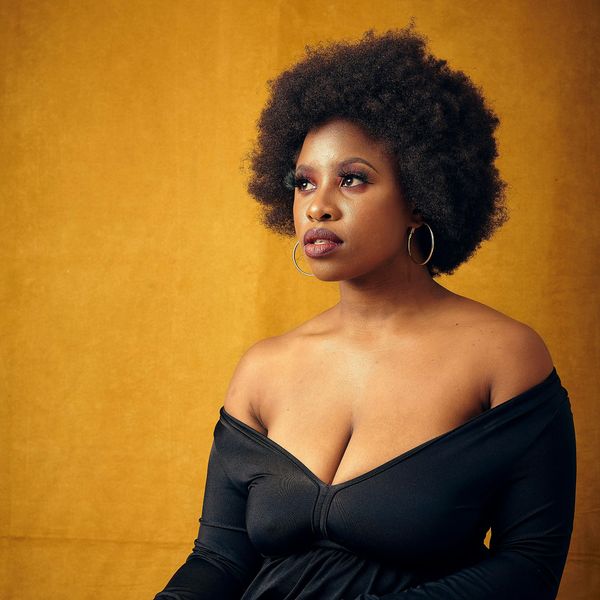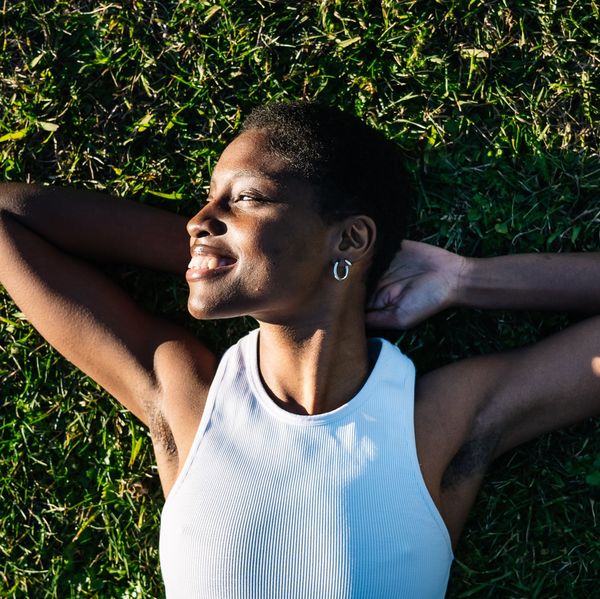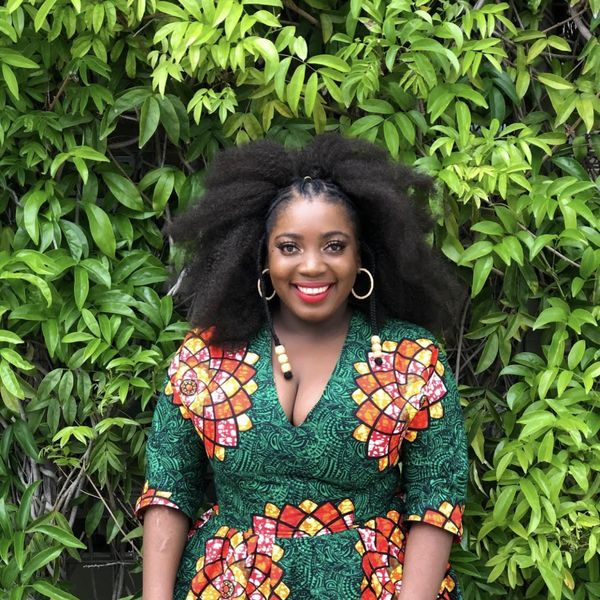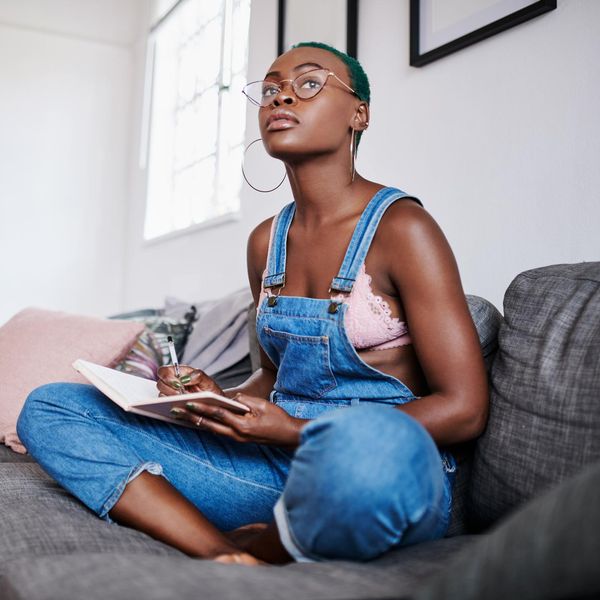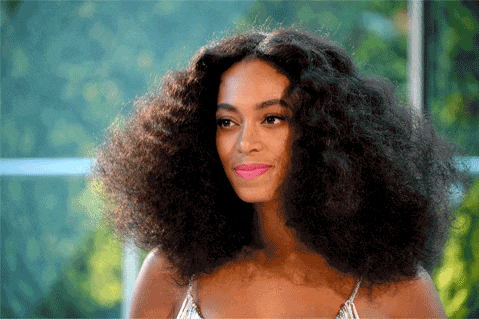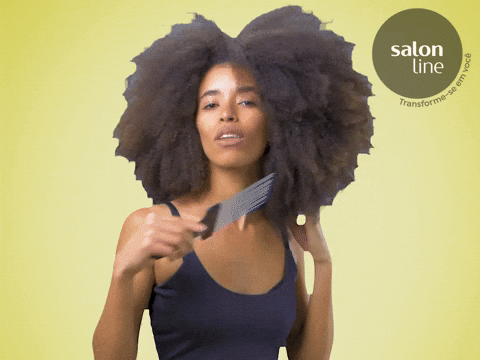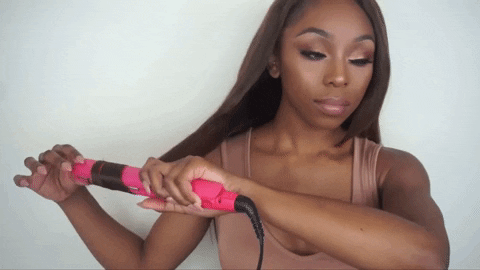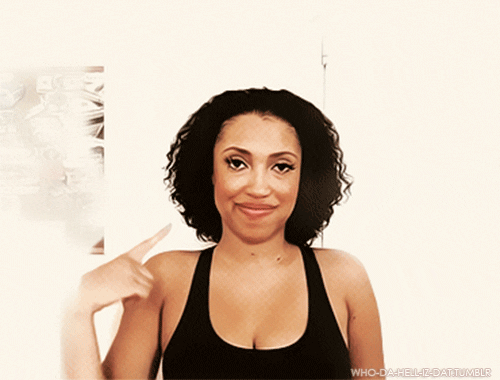
Ease. Peace. Restoration. Preservation. Most of us have probably seen the #softlife hashtag trending or the caption “soft life era” making its way to our feeds on various social media platforms. But what does having a soft life really mean? Despite the way that struggle and hardship are sometimes placed on a pedestal, the soft life trend is about journeying along the path of least resistance, embodying softness, and sensuality, and therefore walking into the fullness of your most authentic self. It is unapologetic feminine energy, and by that I mean, a prioritization of being in a world that places value on doing, achieving, and accomplishing. Your quality of life is no longer about how hard you work, how much you do, and constant sacrificing and compromising.
Instead, the quality of your life is about vibrating higher and knowing who you are beyond those things that society feeds to you as a qualifier of your worth. You rest in your self. You are at peace with your self. You are at one with the nature of ease and the freedom of being. And therefore, you are at one with your self. And no a soft life era doesn’t mean you have to quit your job in order to enjoy the fruits of solitude. Instead, it is about no longer working yourself to the bone or operating from a place of burnout and low self-worth. It’s the antithesis of burnout because you enforce boundaries and limit the energy drainers that have access to you in place of the energy givers.
How can one do this? Alexandra Karlyn, a neuroscientist who is passionate about sharing her soft life journey to others through TikTok and Instagram, explains to xoNecole, "The key to soft living is to acknowledge that you are already worthy. You have nothing to prove to anyone and you don't need to fill a void, because you're already whole, you are already 'that girl.' Your value is not caught up in how productive you are or how well you fit into a capitalist model."
In order to start your own soft life journey, content creator Jaz Turner offers this advice to women, "Practice boundaries, first, with yourself. Do you dread going to the gym? Try a workout class. If that doesn’t feel right, try an at-home online program. Stay authentic, always. Choose the path of least resistance. Listen to yourself, and to your body. Date yourself, and get to know yourself again. Hype yourself up. Let people take care of you. Rest. Relax. Pour into yourself. Do things for yourself that bring the biggest smile to your face. Forgive yourself. Be soft and be gentle with yourself."
For more inspiration to start your soft life era, Alexandra, Jaz, and Anne-Marie O. share their transition from hustle culture to a soft life, what a soft life means to them, and their soft life routines. Here's what they had to say.
What inspired you to transition to a soft life?
I've started to realize that in order to be my best self I have to take breaks and take care of myself. Working 24/7 can get you jaded and obsessed about minuscule things, essentially leading to a whole lot of stress. It sounds bad, but it's simply not worth it. It's not worth it to compromise your physical health as well as your mental health for the sake of hustling and grinding.
As Black women, I often find that we go the extra mile to prove ourselves which often leads to us overworking ourselves. We feel that we have to be there and show up for everyone. My stance is that for now, I'm being here for myself first. I'm looking after myself first. If I am at my happiest, relaxed, and content, I will be my best version. I will be a better girlfriend, daughter, friend, acquaintance, etc. to you.
What is a soft life?
To me, a soft life isn’t lounging around lavishly or brunching to no end. For me, it’s simply avoiding stresses that can lead to burnout, both professionally and privately. It also means recognizing potential stresses and choosing not to invite those into my life. I always say a quiet and abundant life is a happy life!
What does a soft life look like for you?
Although I am a freelancer, I pretty much work 24/7 five times a week. I make it a priority not to be bound to my phone or my laptop after 5:00 p.m. on most days. I celebrate new clients, new skills, and new contracts - regardless of how big or small and often reward myself, whether it is something I've had my eye on for a while or making my favorite breakfast on the weekends. Traveling is also a great way to unwind and nourish your mind and body.
How has life changed for you since entering your soft life era?
I'm a perfectionist so I used to get very stressed and bothered to complete all my tasks, even if that meant working until late hours. I'm now more likely to close my laptop because I recognize that in the grand scheme of things, it can wait until tomorrow.
Walk me through the typical soft life routine you gravitate towards that reminds you of pleasure and leisure.
If my mind is right, my body is right. In the morning, I tend to listen to a meditation on what I currently want to focus on. The internet is great, there's a vast amount of free materials to listen to. Having a healthy breakfast also sets the tone for the day and even sets the tone to decide, “You know what? For dinner, I'm having my favorite takeaway meal.” Also saying yes more can open a whole new horizon of possibilities. Being flexible and open to being spontaneous can completely change the trajectory of your life. In good measure, of course.
For more self-care and soft life from Anne, follow her on TikTok @annemarie_akin.
What inspired you to transition to a soft life?
For me, my hustle culture came in the form of school. From college to law school, to business school, everyone around me was “hustling.” Staying up all night, working hard, grinding, was seen as a badge of honor. The more “stressed” you appeared, the smarter people assumed you were. This hustle mentality had worked for most of my academic career until it did not. My body started to negatively respond to the energy drinks, all-nighters, and law school stress. I realized hustle culture was actually affecting my mental and physical health.
It wasn’t until I left law school, went to business school, and started pursuing TikTok that I started to live in my authenticity. I saw other women on TikTok live in their softness and authenticity. I quickly began to be motivated and inspired to go slower. I saw they were not hustling, were achieving more, and were more purpose-driven than those who prized “hustle culture.”
From the morning routines I saw on TikTok I began to take my mornings slower. I implemented routines and nurtured my passions. I started to pour into myself mentally, physically, emotionally, and spiritually. I began to choose myself and resisted uncomfortability. I was soft with myself. And I noticed once I made this change, I started to achieve even more than I ever had through “hustling.” I was purpose-driven, intentional, and feminine, and started to achieve all my dreams through softness.
What is a soft life?
Soft life means different things to different people. I believe TikTok has a habit of confusing “soft life” with “luxury.” It can tend to over-romanticize this idea of soft life and pigeonhole it into neutral colors, Pilates, and green juice. This is not the case. At least for me, it isn’t. Having a soft life means choosing the path of least resistance. People often think that suffering makes them worthy. Suffering is resistance. Hustle culture is resistance. Soft life is intentionality, mindfulness, daily habits, and routines, it’s a commitment. It's less about luxury, and more about knowing your worth, pouring into yourself. Listening to yourself. Letting things flow, being flexible with your journey.
"Having a soft life means choosing the path of least resistance. People often think that suffering makes them worthy. Suffering is resistance. Hustle culture is resistance. Soft life is intentionality, mindfulness, daily habits, and routines, it’s a commitment. It's less about luxury, and more about knowing your worth, pouring into yourself. Listening to yourself. Letting things flow, being flexible with your journey."
How has life changed for you since entering your soft life era?
Life has done a complete 180. I have actually accomplished more, achieved more, and have been a million times less stressed ever since entering my soft life era. Showing my healing journey, my soft life era, my femininity, on TikTok and IG has garnered a community of women who are like-minded, supportive, and authentic. I have built an income and a lifestyle from being soft with myself and motivating and inspiring others to live in this softness.
Walk me through the typical soft life routine you gravitate towards that reminds you of pleasure and leisure.
For me, soft life comes in its most pronounced form in the morning. I start every morning prioritizing myself. From choosing an alarm of birds chirping to wake up to, to my silk PJs that make me feel like “that girl,” to my cute Pilates/yoga set. To going to yoga or Pilates or any low-impact workout that makes my body feel good. To coming home to drink my green juice and my favorite avocado toast. To journaling and meditating before engaging with my TikTok community. I do this routine every morning, and prioritize myself before anyone else. I do this so that I can give people my all throughout the day, but not before myself.
My soft life can also come in the form of setting boundaries. With myself, my personal relationships, and professional relationships. It means listening to myself and noticing how I am feeling, and what that feeling is signifying. I am consistently authentic with myself. I live in and nurture my femininity, and lean into what brings me joy and passion.
Soft life can also mean if I wake up in the morning and don't want to work out, then that is how I am feeling, I honor that feeling, and I proceed as such. If I don't work out, I may spend a few extra minutes meditating or doing something else “good” for myself that morning.
For more soft life motivation and inspiration from Jaz, follow her on TikTok @jazturner16.
What inspired you to transition to a soft life?
Several burnouts during lockdown led to my transition away from hustle culture. Before making the switch, I was staying up late dreading the next day, and was constantly exhausted by the balancing act that I had come to call life. Time was just moving too fast. My journey to living a "soft life" began with a list of things that I would rather be doing with my time. Subsequently, I began looking for ways to create a life around that list.
What is a soft life?
A soft life means no longer feeling guilty about prioritizing a life that makes you feel happy. We work to live, not live to work, and that is something that we often overlook.
What does a soft life look like for you?
My soft life currently reflects three aspects: time with my kids and spouse, time doing things that I enjoy, and time to just be. This often means sitting out in the sun, rereading my favorite childhood novels to my kids, morning bicycle rides to the bakery, and things that I used to do as a child (roller skating, swinging at the park, painting, etc.) Why should we stop doing the activities that made us happy as children? I think it's important to make time for those things into adulthood.
How has life changed for you since entering your soft life era?
I'm happier. Now I have very clear boundaries when it comes to work and play. In addition, I've found that I procrastinate less and don't feel badly about not being productive every day. Ultimately, life no longer feels like a hamster wheel, one long work day with naps in between.
Walk me through the typical soft life routine you gravitate towards that reminds you of pleasure and leisure.
It's important that we acknowledge that a soft life looks different for everyone. Some people have to work more hours, whereas others have more flexibility. At the moment, I have "on days" and "off days." My "on days" are structured and productive from a work perspective, those days are when the bulk of my responsibilities are met. In contrast, "off days" are mostly doing what I feel like doing. Typically that involves doing something I enjoyed as a child: going for a bike ride while eating ice cream, creating a home DIY, watching my favorite movie, taking myself to breakfast, or just laying in the sun doing absolutely nothing.
The best part about it is it's guilt-free because I've set boundaries on when I work and when I relax.
For more soft life living inspo from Alexandra, follow her on TikTok @lexakarlyn.
Featured image courtesy of Anne-Marie O.
- Women In Their 30s Share The Important Lessons Their 20s Taught ... ›
- 10 Ways To Live A Soft Life When You Can't Afford To - xoNecole: Women's Interest, Love, Wellness, Beauty ›
- Black Girl's Healing House Founder Gives Tips on Soft Life - xoNecole: Women's Interest, Love, Wellness, Beauty ›
- Top Wellness Habits of Successful Black Women - xoNecole: Lifestyle, Culture, Love, & Wellness ›
This Is How To Keep 'Holiday Season Stress' From Infecting Your Relationship
Hmph. Maybe it’s just me, but it seems like there is something really weird happening in the fall season air (because winter doesn’t officially begin until December 21) that cuddle season is in full swing while break-up season is as well. In fact, did you know that break-ups are so popular during the holiday season that December 11 is deemed Break-Up Day?
The reasons why relationships shift around this time vary; however, I did both roll my eyes and chuckle when I read that a very popular one is because it’s an easy way to get out of getting one’s significant other a Christmas present. SMDH.
Anyway, I personally think that the less shallow folks out here may contemplate calling things “quits” or they at least distance themselves a bit from their partner (and what I’m referring to is serious relationships) due to all of the stress and strain that oftentimes comes with the holidays whether it be financial, familial, due to their tight schedules or something else.
Listen, I would hate for you and your man to miss the fun and happiness of experiencing this time of year, all because you are so overwhelmed or irritated that you can’t really enjoy it. That’s why I have a few practical tips for how to avoid allowing the typical holiday season stress from INFECTING your relationship.
Manage Your Expectations
 Giphy
GiphyUnmanaged expectations. If there is a main reason why the holiday season tends to be so stress-filled for so many people, I’d bet good money that this is the cause. And when you’re in a long-term relationship, expectations can manifest themselves in all sorts of cryptic and/or unexpected ways. You might have relatives who assume that you are going to be with them for Thanksgiving or Christmas when you have other plans in mind. You might be thinking that you are going to spend one amount for presents while your man is thinking something totally different. When it comes to scheduling, your signals may be crossed.
And you know what? To all of these scenarios, this is where clear and consistent communication come in. Don’t assume anything. Don’t dictate anything either. From now until New Year’s, mutually decide to check in once a week, just to make sure that you are both on the same page as it relates to the holidays and what you both are thinking will come along with it. The less blindsided you both feel, the less stressed out you will be. Trust me on this.
Set (and Keep) a Budget
 Giphy
GiphyOkay, so I read that last year, 36 percent of Americans incurred some type of holiday-related debt. Hmph. Last year, there was still some sense of normalcy in this country, chile, so I can only imagine what finances are gonna look like over the next several weeks. That said, since I don’t know a lot of people who don’t find being broke stressful, make sure that you and your bae set a budget and then stick to it this year — no ifs, ands or buts.
Because really, y’all — it doesn’t make sense to deplete savings and/or max out credit cards for a few days of giggles only to be damn near losing your mind because you don’t know how to make ends meet come Dr. Martin Luther King, Jr. Day.
And by the way, this tip doesn’t just speak to things like food and gifts; I also mean travel. If it doesn’t make a ton of sense (or cents) to be all over the place this year — DON’T BE.
Keep Matthew 5:37 at the Forefront
 Giphy
GiphyIf off the top of your head, you don’t know what Matthew 5:37 says, no worries, here ya go: “But let your ‘Yes’ be ‘Yes,’ and your ‘No,’ ‘No.’ For whatever is more than these is from the evil one.” That verse right there? Oh, it’s a boundaries lifesaver! I say that because do you see “maybe” or “I’ll think about it” in there? Nope. LOL. It says that you should tell people “yes” or “no” and leave it at that — and that complements Anne Lamott’s quote, “’No’ is a complete sentence” impeccably well. Yeah, you’ve got to remember that anything beyond a yes or no to a request is privileged information; you don’t owe anyone details or an explanation.
Besides, if you are really honest with yourself, when someone asks you something and you give a “Umm, let me think about it” kind of reply, more times than not, you already know what your answer is going to be — so why not let you both off of the hook? Give your response. Commit to that. And let everyone (including yourself) get on with their lives and schedules.
I promise you that when it comes to those holiday parties, you are pissing more folks off by not RSVP’ing or doing so and not showing up than just saying, “Thank you but not this year” off the rip.
Remember That Your Personal Space Is Privilege Not a Right
 Giphy
GiphyA friend of mine recently bought a new house and invited me over to come see it. He’s a single man with no children, so as I was taking in all of the space that he had, especially as I walked through his finished basement, I joked about relatives coming to live with him. “Hell no” and “absolutely not” were pretty much his immediate responses as he went on to say that some folks even had the nerve to be offended when he told them that he had no intentions on taking DNA in.
Ain’t it wild how people think that your stuff is their right? And yes, that brings me to my next point. Your home is your sanctuary space. If you want to host folks this year — cool. If not, ALSO COOL. Please don’t let folks (family included) guilt you into how they want you to act or even into what they would do if the shoe was on the other foot. You are not them — and as one of my favorite quotes states, “If two people were exactly alike, one of them would be unnecessary.” (A man by the name Larry Dixon said that.)
Hell, my friends? They know that I am good for sending them random things that they need or even want all throughout the year. Coming over to hang out at my pace, though. Uh-uh. Chalk it up to being a card-carrying member of the ambivert club yet I like keeping my living space personal — and I sleep like a baby, each and every night, for feeling that way.
Always remember that your space, your time, your resources, your energy and shoot, yourself period (including your relationship), are all things that are your own. You get to choose how, when and why you want to share them. The holiday season is certainly no exception.
Cultivate Some “You Two Only” Traditions
 Giphy
GiphyIt’s not uncommon for some couples to hit me up after the holiday season to “detox.” Sometimes it’s due to the financial drama (and sometimes trauma) that they experienced. Sometimes it’s because they allowed their relatives (especially in-laws) to get more into their personal business than they should’ve. More than anything, though, it tends to be because they didn’t get enough quality time together and so ended up feeling “disconnected.”
Please don’t let that happen. Listen, I’m not even a holidays kind of woman and yet, I will absolutely sit myself down with some hot chocolate and chocolate chip cookies to enjoy a Hallmark holiday film or two. Aside from the fact that most of them are lighthearted and sweet, I also like that they usually focus on couples loving on each other amidst all of the holiday beauty and ambiance — which is something that all couples should set aside some time to do.
Maybe it’s a vacation. Maybe it’s a staycation. Or maybe it’s my personal favorite, A SEXCATION. Whether it’s for a few days, the weekend or even overnight — don’t you let the holidays go by without setting aside time for you and your man to celebrate one another. Don’t you dare (check out “Are You Ready To Have Some Very Merry 'Christmas Sex'?”).
GET. SOME. REST.
 Giphy
GiphyI once read that 8 out of 10 people get stressed out over the holidays and 3 out of 10 lose sleep during to it — and when you’re stress-filled and sleep-deprived, that can absolutely lead to hypersensitivity, making mountains out of molehills and even not being in the mood for sex.
Your relationship can’t afford to go through any of this, so definitely make sure to prioritize rest. I don’t care how unrealistic it might seem during this time, sleep should never be seen as a luxury; it will always and forever be a great necessity.
That said, try to get no less than six hours of shut-eye in (check out “6 Fascinating Ways Sex And Sleep Definitely Go Hand In Hand”) and even ask your bae to take a nap with you sometimes (check out “Wanna Have Some Next-Level Sex? Take A Nap, Sis.”). Not only will sleep help to restore your mind, body and spirit but, when it’s with your partner, it’s an act of intimacy that can make you both feel super connected, even in the midst of what might feel like chaos.
___
Holiday season stress is real. Still, never give it the permission or power to throw your relationship off. Put you and your man first and let the holidays be what they are gonna be, chile.
Let’s make things inbox official! Sign up for the xoNecole newsletter for love, wellness, career, and exclusive content delivered straight to your inbox.
Featured image by Shutterstock
It’s probably been over the past 2-3 years that I’ve become hyper-focused when it comes to applying certain chemical exfoliants known as acids to my skin. Personally, I’ve come to really appreciate ones like mandelic acid and hyaluronic acid because they have a way of softening my skin, brightening it up and really evening out my complexion overall.
In fact, on my skin, they have been so effective that they have caused me to wonder what would happen if I applied some of them to my hair too — and boy, was it an experiment that paid off big time!
If, while on your continual journey to get the best out of your own tresses, you’d like to learn how to get them healthier than it’s ever been, I’ve got seven acids that are typically known for skin use that can be just as beneficial to your hair as well.
1. Salicylic Acid
When it comes to your skin, salicylic acid is beta-hydroxy acid that is great for your skin if you’re looking for something that will exfoliate it, clear out your pores and dissolve dead skin cells. In fact, this is why it’s an acid that is quite popular when it comes to treating acne.
Your hair will enjoy salicylic acid because, if you’re looking to remove product build-up, you want to soothe an itchy or irritated scalp or you’ve got some dandruff flakes that are totally driving you up the wall, salicylic acid has the ability to treat all of this. Either purchasing a shampoo that contains this ingredient or adding it to your favorite scalp scrub is probably the most effective way to get the most out of it.
Just make sure that if your scalp is sensitive or dry that you approach with caution. In these instances, it could end up irritating your scalp more than helping it out, so use a very little bit in the beginning to make sure that it vibes with you.
2. Lactic Acid
Lactic acid is an alpha hydroxy acid that can help to even out your skin tone as well as slow down the signs of aging. The properties in it help to do this by reducing hyperpigmentation and boosting collagen production in your skin as well as keeping it hydrated.
Why is it great for your locks? For one thing, lactic acid is considered to be a humectant. This means that it pulls water from the air so that your hair is able to remain moisturized.
Another thing that makes it a winner is the fact that lactic acid breaks down dead skin cells on your scalp (so that your hair follicles are able to flourish), it can help to soften and detangle your hair (making it a helpful addition on your wash days) and it also helps to protect your tresses from heat styling tools and UV damage. Applying a hair rinse that’s made up of part lactic acid and part water can work wonderfully (so long as you apply it once a month, tops; more than that might be too “intense” for your hair strands).
3. Glycolic Acid
Glycolic acid is a water-soluble alpha hydroxy acid that is actually made from sugar. Your skin will adore it because it smooths the appearance of fine lines and wrinkles, improves the texture of your skin, gently exfoliates, clears your pores and brightens up your complexion overall.
The reasons why you should consider this acid for your hair is because it helps to keep your scalp youthful (and yes, there is such a thing; check out “Your Scalp Ages Six Times Faster Than Your Face. Why It Matters.”), removes excess sebum (that could be clogging up your hair follicles) and it helps to keep your hair moisturized. Your best bet here is to make it a part of your pre-shampooing ritual.
4. Succinic Acid
Succinic acid is an acid that is made from sugar cane and contains antimicrobial and anti-inflammatory properties. Although it doesn’t exactly exfoliate (like many of these other acids do), it can still be beneficial to your skin when it comes to reducing the kind of irritation that is associated with eczema, decreasing the bacteria that leads to breakouts and keeping your skin pretty hydrated.
As far as your hair goes, this is an acid that is worth trying out because it helps to balance the sebum that is on your scalp, remove dead skin and product build-up that can irritate your scalp and clog your hair follicles and, succinic acid is also beneficial when it comes to reducing dandruff and helping to prevent hair loss. Most people tend to apply this as a serum.
5. Hyaluronic Acid
I’ve officially sung the praises of hyaluronic acid on this platform before. One example is via the article, “Why Your Skin, Hair, And Nails Need Hyaluronic Acid Like...Yesterday.” On the skin tip, hyaluronic acid is great because it deeply hydrates your skin, contains anti-aging properties and can even bring relief to vaginal (including vulvar) dryness.
Your hair will adore this particular acid because it aids moisture to it (including your hair follicles), will help to improve your hair’s texture and it also soothes scalp dryness, nurtures the cuticles of your tresses and decreases frizz. Using a serum rich in this acid as a pre-poo or as a leave-in conditioner is recommended.
6. Azelaic Acid
If you’ve never heard of azelaic acid before, this is your lucky day. It’s a dicarboxylic acid that, when it comes to skincare (and hair care) products, is usually synthetic. Anyway, if you are looking for a way to reduce inflammation, even skin tone after a breakout or if you want to use an exfoliant that will improve the texture of your skin overtime, you might want to give this acid a shot.
This one makes the list as far as your hair is concerned because, if achieving more inches is your current focus, azelaic acid might come in handy. That’s because it is able to strengthen your hair, thicken your strands and also stimulate hair growth from within your hair follicles.
7. Glutamic Acid
Glutamic acid is actually a type of amino acid. Skin-wise, it’s great for deeply hydrating your skin as well as protecting it from pollutants and damaging UV rays. Also, if you’re looking for an acid that treats skin dryness or “tightness,” this could be the answer to your prayers.
Since glutamic acid is also considered to be a humectant, it’s another acid that can moisturize your hair. As a result, it can decrease breakage while helping your hair to feel smooth and look shiny.
BONUS: Amino Acids
Speaking of amino acids and hair, please try to keep some amino acids in your diet at all times. The reason why is because, since your hair is made up of mostly protein (keratin, to be exact), amino acids are pretty darn effective when it comes to helping you to maintain the overall health and well-being of your hair.
Ones to prioritize include proline (it boosts collagen so that your hair strands can maintain flexibility); arginine (it increases blood flow to your hair follicles so that they can receive the nutrients that they need); cysteine (it helps to keep your hair follicles healthy); alanine (it helps your system to produce more collagen), and isoleucine (it strengthens the tissues that help to make up your hair strands). All of these are available in supplement form or you can use Google to see which foods contain them.
___
Although it might initially seem odd to apply acid to your hair, as you can see, certain ones will work miracles for it. So, test them out to see which one tickles your fancy.
Hell, since they work for your skin as well — it’s a two-for-one deal that is worth every penny!
Let’s make things inbox official! Sign up for the xoNecole newsletter for love, wellness, career, and exclusive content delivered straight to your inbox.
Featured image by Shutterstock



